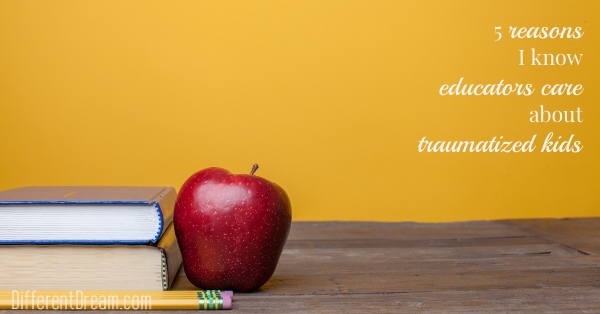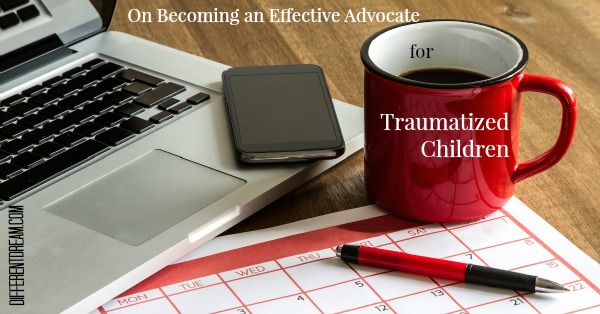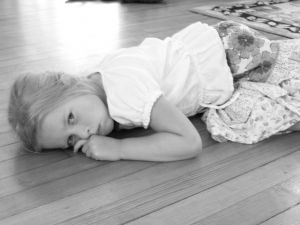Educators Care about Traumatized Kids

Educators care about traumatized kids. I came to this conclusion after facilitating professional development classes for more than 80 Iowa classroom and special education teachers, substitutes, paraprofessionals, and administrators this past summer. Whether they work with children in birth to 3 programs, in preschool programs, from kindergarteners to high school seniors, educators care about traumatized kids. While working with 4 different groups, these educators exhibited a number of similar characteristics that led to this conclusion. I’d like to share them with you now.
Educators do work in the summer. Many of them without pay. Plus, most of them pay for classes out of their own pockets. (Few other professions require their workers to pay for license renewal hours.) For 1 license renewal credit, educators are required to put in 2 full days plus homework. They signed away 2 days gorgeous summer days for this particular class, An Educator’s Guide to PTSD in Children, because they feel ill-equipped to meet the needs of the traumatized kids in their schools. They want to do better.
Educators can’t know what they don’t know. They don’t receive trauma training in college and can’t be faulted for not knowing what they don’t know. Instead they should be applauded for devoting 2 full days of summer vacation to filling in this knowledge gap. By the end of the second day of class, when their brains feel like mush after absorbing and processing a great deal of new learning, much of it from Does My Child Have PTSD? What To Do When Your Child Is Hurting from the Inside Out, they are eager to apply what they know when a new school year begins.
Educators are creative and practical. Every person who takes the class has to develop an action plan describing 3 strategies they will implement to make traumatized children feel safer at school. From school administrators to paraprofessionals, from elementary to secondary teachers, the creativity of their action plans blows me away time after time. Not only are the strategies appropriate for the developmental levels of their students and in line with their positions, they are practical and doable. Which means the strategies are much more likely to be implemented and maintained.
Educators go the extra mile. While their action plans are creative and practical, the strategies they select require extra effort. In addition to taking the class on their own time and dime, educators spend extra time putting their strategies in place. They also spend their own money on needed supplies. Like markers and stress balls for a quiet corner in the classroom. Or snacks for kids who come to school hungry.
Educators care about traumatized kids. A strategy many teachers and paraprofessionals choose is to talk to their district administrators about providing more trauma training in schools. Many administrators who take the class include developing more trauma training for the teachers in their action plans. Why? Because all these these educators care about traumatized kids. Once they know more about how to make a difference in their students’ lives, they want to teach their colleagues about it.
After all, they’re teachers, and they love doing what they do best. They love to teach.
Do you like what you see at DifferentDream.com? You can receive more great content by subscribing to the monthly Different Dream newsletter and signing up for the daily RSS feed delivered to your email inbox. You can sign up at the bottom of this page.
By Jolene
Jolene Philo is a published author, speaker, wife, and mother of a son with special needs.
2 Comments
Submit a Comment
Subscribe for Updates from Jolene
Related Posts
How Parents Can Advocate Effectively for Traumatized Children
Traumatized children need adults to advocate on their behalf. This post discusses three skills parents must cultivate to be effective advocates for them.
4 Childhood Trauma and PTSD Updates
Childhood trauma and PTSD has been in the news a great deal lately. Here are 4 stories that show awareness is growing about this mental illness in kids.
Study Says Raising Kids with Special Needs Creates Parental Stress
A study found that demands of caring for a chronically ill child with special needs creates parental stress. It offers tips about how to relieve stress.






Hi Gary, you make a good point, and it is the first thing I tell educators taking the class. They are trained to teach, not provide therapy. The whole purpose of the class is to help them better understand why children with unresolved trauma act as they do, to point them to resources, and to help them develop ways to make traumatized kids feel safer at school. They should not be trained to provide therapy. They have enough to do teaching our kids. Thanks for your comment! Jolene
As a retired therapist and a trainer on Trauma Based Care let me say that the best thing we can do is train educators to treat every child with respect, warmth, and empathy. (No sympathy). The most important attributes for therapists are the same. It is not a good idea to try to turn teachers into therapists that assess trauma and over focus on them. We suggest that Mentor/Befrienders be trained to support at risk kids and bed present for educators.